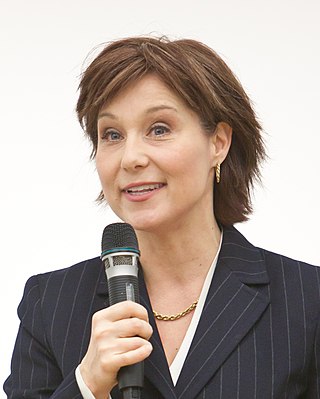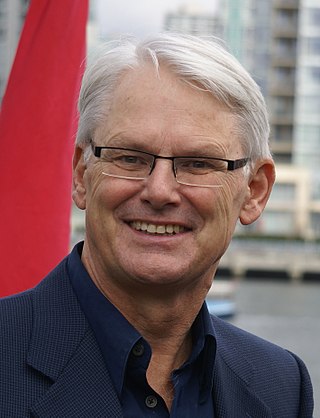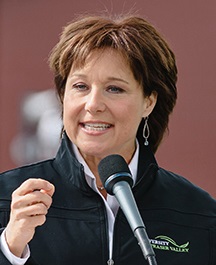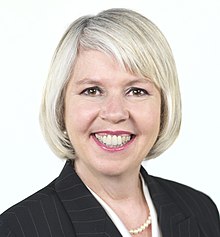BC United (BCU), known from 1903 until 2023 as the British Columbia Liberal Party or BC Liberals, is a provincial political party in British Columbia, Canada. The party has been described as conservative, neoliberal, and occupying a centre-right position on the left–right political spectrum. The party commonly describes itself as a "free enterprise coalition" and draws support from members of both the federal Liberal and Conservative parties. From 1991 to 2024, BC United was the main centre-right opposition to the centre-left New Democratic Party (NDP). Once affiliated with the Liberal Party of Canada, the British Columbia Liberal Party became independent in 1987. The party changed its name to BC United on April 12, 2023.
The Green Party of British Columbia, or simply the BC Greens, is a provincial political party in British Columbia, Canada. It was founded in 1983 and is based in Victoria. The party won its first seat in the Legislative Assembly of British Columbia in the 2013 provincial election.
The New Democratic Party of British Columbia is a social democratic political party in British Columbia, Canada. The party sits on the centre-left of the political spectrum and is one of the two major parties in British Columbia; since the 1990s, its rival was the centre-right BC United until the Conservative Party of British Columbia reconstituted itself for the 2024 British Columbia general election, with BC United withdrawing its candidates and endorsing the Conservatives. The party is formally affiliated with the federal New Democratic Party and serves as its provincial branch.

Christina Joan Clark is a Canadian politician who served as the 35th premier of British Columbia from 2011 to 2017. Clark was the second woman to be premier of BC, after Rita Johnston in 1991, and the first female premier in Canada to lead her party to a plurality of seats in two consecutive general elections.
The Green Party of Manitoba ('GPM') is a green provincial political party in Manitoba, Canada, founded on November 11, 1998. The party is legally autonomous from the Green Party of Canada, though for several years many of its members also belonged to the Green Party of Canada in Manitoba, a federal organization established in 1996. The GPM has maintained a position as the fourth largest party in Manitoba since the 2003 election until the 2023 Manitoba general election, both in the number of votes received and candidates run.

Stuart Parker is a Canadian politician who was the acting leader of the BC Ecosocialists party in 2020 and was the leader of the Green Party in British Columbia, Canada, from 1993 to 2000. In 2009, during the Ontario by-election to replace MPP Michael Bryant, he unsuccessfully sought the Ontario New Democratic Party nomination for the St. Paul's provincial riding.

The 2005 British Columbia general election was held on May 17, 2005, to elect members of the Legislative Assembly (MLAs) of the Province of British Columbia (BC), Canada. The British Columbia Liberal Party formed the government of the province prior to this general election under the leadership of Premier Gordon Campbell. The main opposition was the British Columbia New Democratic Party, whose electoral representation was reduced to two MLAs in the previous provincial election in 2001.

Saanich—Gulf Islands is a federal electoral district in British Columbia, Canada, that has been represented in the House of Commons of Canada since 1988. It is named for its geographical location across the Gulf Islands and Saanich Peninsula in the Vancouver Island region.
This page shows results of Canadian federal elections on Vancouver Island.
The Green Party of Canada was founded at a conference held at Carleton University in Ottawa in 1983.

John Joseph Horgan was a Canadian politician and diplomat who served as the 36th premier of British Columbia from 2017 to 2022 and the ambassador of Canada to Germany from 2023 to 2024. He led the British Columbia New Democratic Party from 2014 to 2022, guiding the party to government after 16 years in opposition. A member of the Legislative Assembly of British Columbia (MLA) from 2005 to 2023, he represented the riding of Langford-Juan de Fuca.

Jane Sterk is a Canadian psychologist, businesswoman, academic, and politician. She is the former leader of the Green Party of British Columbia and a business professor at University Canada West. In the 2009 British Columbia provincial election she was a candidate in the riding of Esquimalt-Royal Roads and in the 2013 election was a candidate in Victoria-Beacon Hill. Sterk was elected councillor in the Township of Esquimalt in 2005 was elected leader of the provincial Green Party in October 2007. In the 2004 federal election and the 2005 provincial election as a candidate in the Esquimalt ridings, she placed fourth and third with 9% and 10% of the vote, respectively.

Mable Elmore is a Canadian politician that represents the Vancouver-Kensington electoral district in the Legislative Assembly of British Columbia. A member of the British Columbia New Democratic Party, she was first elected as a Member of the Legislative Assembly (MLA) in the 2009 provincial election. Currently the Parliamentary Secretary for Anti-Racism Initiatives, she previously served as the Parliamentary Secretary for Poverty Reduction (2017–2020) and Parliamentary Secretary for Seniors Services and Long Term Care (2020–2022).

The Green Party of Vancouver, founded in 1984, is a municipal political party in Vancouver, British Columbia, Canada. It is affiliated with both the provincial Green Party of British Columbia and the federal Green Party of Canada.

Andrew Wilkinson is an Australian-born Canadian politician. He is the former leader of the British Columbia Liberal Party, and served as the leader of British Columbia's Official Opposition. He was elected to the Legislative Assembly of British Columbia in the 2013 provincial election and re-elected in 2017 and 2020. He represented the electoral district of Vancouver-Quilchena.

The 2017 British Columbia general election was held on May 9, 2017, to elect 87 members (MLAs) to the Legislative Assembly to serve in the 41st Parliament of the Canadian province of British Columbia. In the 40th Parliament prior to this general election, the British Columbia Liberal Party formed the government under the leadership of Christy Clark, while the British Columbia New Democratic Party (NDP), under the leadership of Adrian Dix and then John Horgan, formed the Official Opposition; the Green Party of British Columbia were also represented in the legislature with sole MLA and later leader Andrew Weaver.

Sonia Furstenau is a Canadian former politician who served leader of the Green Party of British Columbia from 2020 to 2025. She also served as the MLA for Cowichan Valley from 2017 to 2024, after she was defeated when unsuccessfully attempting to switch constituencies.

The 2020 British Columbia general election was held on October 24, 2020, to elect members of the Legislative Assembly to serve in the 42nd parliament of the Canadian province of British Columbia. The incumbent New Democratic Party of British Columbia won a majority government, making John Horgan the first leader in the history of the BC NDP to win a second consecutive term as premier. The incoming Legislature marked the first time the NDP commanded an outright majority government in BC since the 1996 election, as well as the first province-wide popular vote win for the party since 1991.

A referendum on electoral reform took place by mail-in ballot between October 22 and December 7, 2018, in the Canadian province of British Columbia. 61.3 percent of voters supported maintaining the first-past-the-post voting system rather than switching to a proportional representation voting system, which was supported by 38.7 percent of voters. This was British Columbia's third referendum on electoral reform, following ones in 2005 and 2009.













